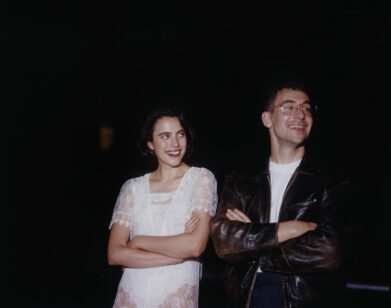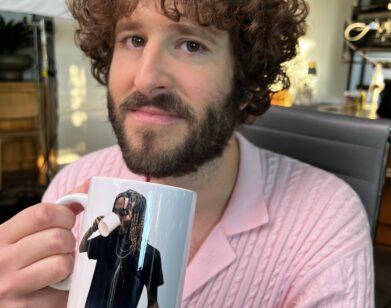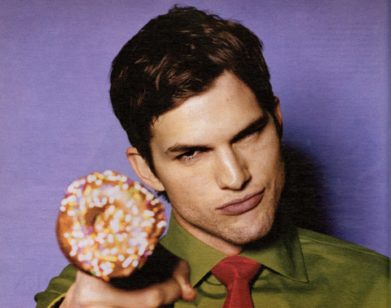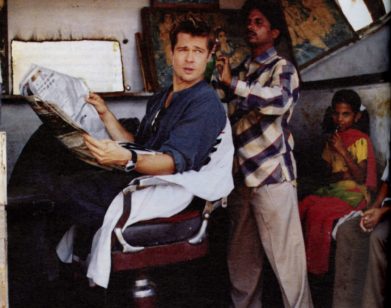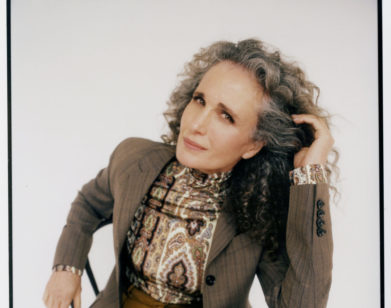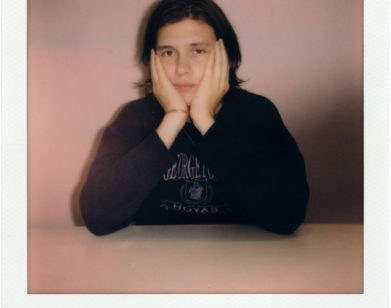in conversation
Margaret Qualley Is a Bookworm at Heart
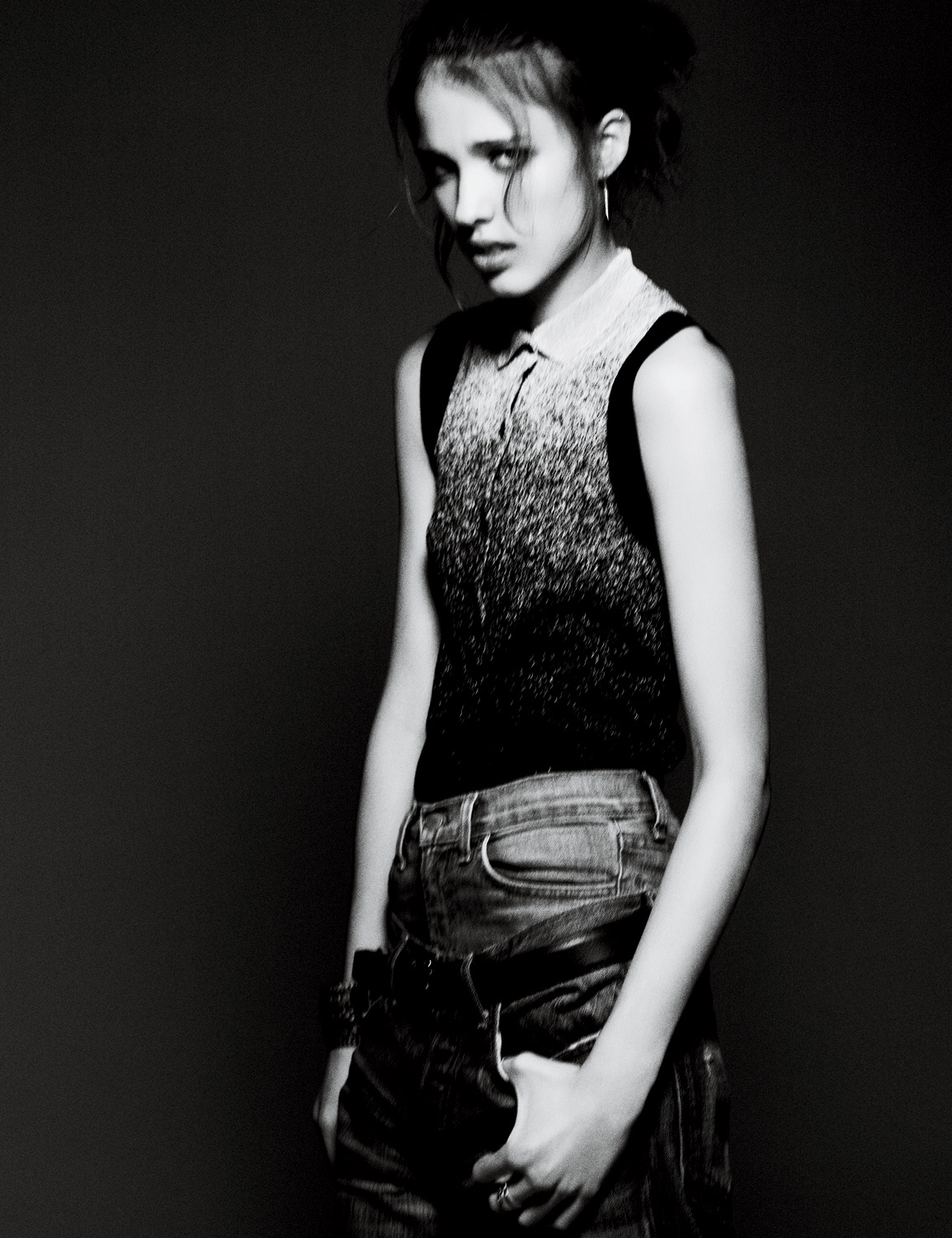
Margaret Qualley, photographed by Gregory Harris for Interview in 2011.
In 1995, Joanna Rakoff moved from Berkeley, California to New York City, where she took a job at one of the nation’s oldest literary agencies that represented the likes of J.D. Salinger. Fifteen years later, Sarah Margaret Qualley left her home in Asheville, North Carolina—which she shared with her parents, the actor Andie MacDowell and model Paul Qualley, to pursue dance in the same city, living on her own at age 16. Like Joanna, who immortalized her experience navigating the buttoned-up world of New York publishing in her memoir My Salinger Year, Qualley soon realized her dreams weren’t all what they cracked up to be. Qualley dropped the Sarah, pivoted to modeling and acting, and soon captivated audiences in the HBO series The Leftovers as the daughter of Justin Theroux. She became something of an ingenue, a familiar face to both fashion magazine readers and Tarantino fans, who saw her make Brad Pitt weak in the knees in Once Upon a Time … in Hollywood. But it was Qualley’s turn on The Leftovers that caught the attention of Rakoff; when casting the role of her younger self for the My Salinger Year film adaptation, now in theaters and streaming, Qualley was her first—and only—pick. Qualley took a brief break filming another adaptation of a memoir, the Netflix miniseries Maid, to talk to Rakoff herself about books, ballet, and navigating life on your own terms. —SARAH NECHAMKIN
———
MARGARET QUALLEY: Joanna!
JOANNA RAKOFF: Hi, Margaret. Where are you?
QUALLEY: I am in Canada. I’ve been here for six months now. I’ve got two more months to go. I’m full-on Canadian. Where are you?
RAKOFF: I’m just in Cambridge. I basically have not left here all year, I think.
QUALLEY: Good.
RAKOFF: Are you shooting Maid right now?
QUALLEY: I am. My brain is scrambled eggs, so forgive me. I worked a night, and I’m pumped up on caffeine. I’m ready to go.
RAKOFF: You are talking to someone who, as I think you know, has a youngest child who at five still does not sleep. So that’s basically how I am all the time.
QUALLEY: Oh, great. That’s really horrible for you. You have a five-year-old insomniac?
RAKOFF: Yeah. She just is one of those really energetic, curious kids. She doesn’t want to miss anything.
QUALLEY: I was that five-year-old.
RAKOFF: I can see that. Well if Izzy grows up to be like you, it will all be okay. It’ll all be worth it.
QUALLEY: No, I don’t know that it will be. I’m still an insomniac. Tell her to buckle up.
RAKOFF: I will. It’s funny, because before I gave birth, we were going to name her Sarah.
QUALLEY: No way. And it’s Izzy?
RAKOFF: Her name is Isadora.
QUALLEY: Isadora. I think you made a good call. My sister’s name is Rainsford, and I’m like, “Mom, I don’t understand how you gave Rainsford Rainsford and then I got Sarah Margaret? You were out of all your creative energy? We had to go with Sarah, guys? Alright, cool. Thank you.”
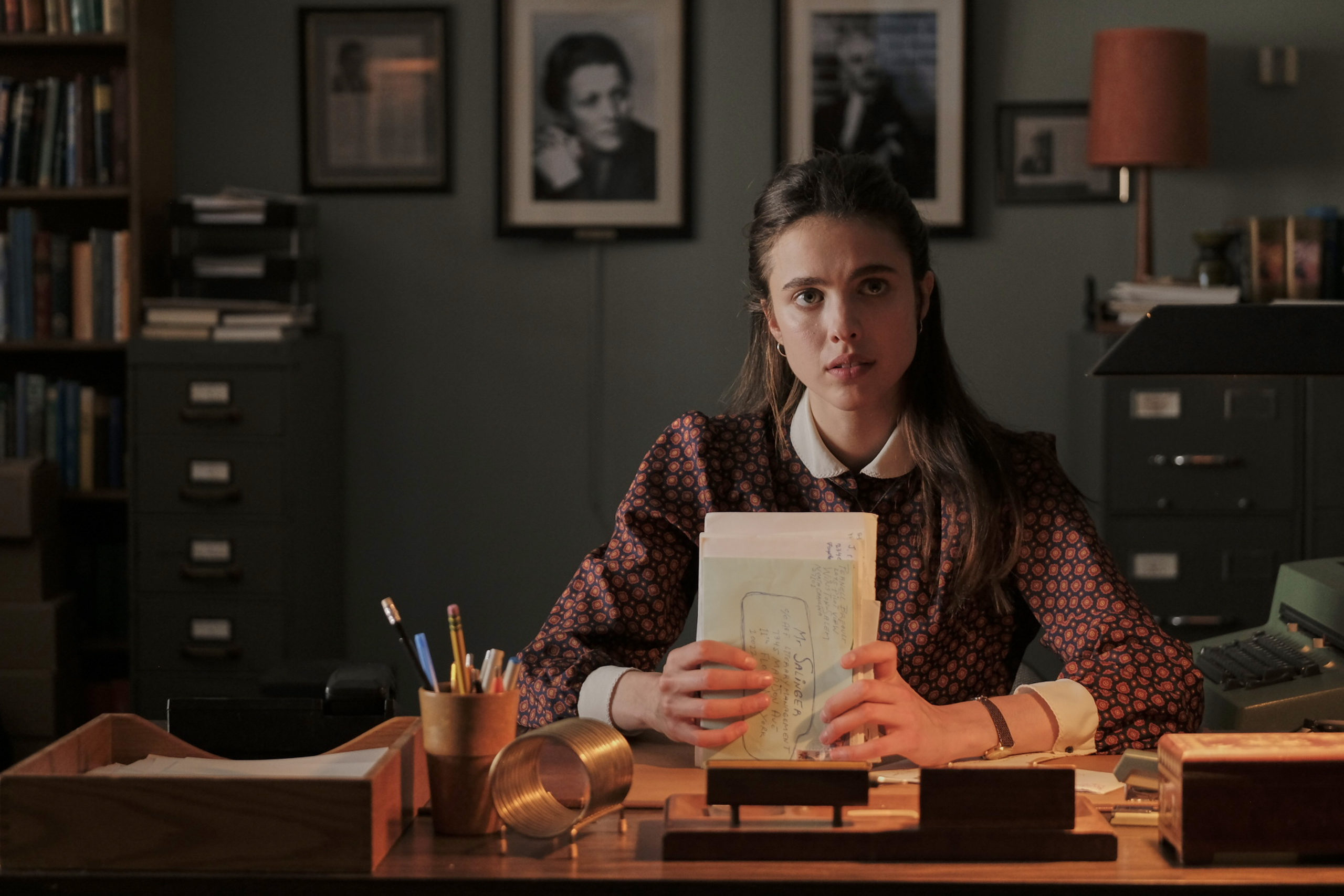
Qualley in My Salinger Year. Photo by Philippe Bosse.
RAKOFF: How is working with your mom [on Maid]?
QUALLEY: It’s awesome. It’s especially awesome just for like selfish, logistic reasons. I’ve been here for six months in quarantine, and you can’t have visitor. It’s really lovely to have my mom here. I go and have dinner with her on Sundays. She cooks for me, and it’s great. And then as far as working with her, it’s also awesome. She’s an amazing actress, so I feel lucky. And then on top of it, you walk into the room and your mom’s your mom and that’s undeniable, so it makes my job a little easier. I’m not having to bend reality too much.
RAKOFF: For readers, I wonder if you could take a second and just tell them about the project.
QUALLEY: It’s based off of a novel written by Stephanie Land about herself and her experience with being a single mom and just struggling to get by. And she’s leaving an emotionally abusive relationship. She’s doing everything that she can to keep her child’s life a good life. She’s really struggling against the system. It’s a complete departure from my life. I’m so privileged, but I’m really excited to be able to bring this story to life. In the TV version, the miniseries that we’re doing, my character’s name is Alex, and my mother plays Alex’s mother. But it’s very much a departure—a lot of Stephanie’s experiences were different from Alex’s experiences.
RAKOFF: It’s such a great role for you. So I want to explain this one tiny thing. You were my first choice to play me. In fact, you were actually my only choice.
QUALLEY: Aww. That’s really fucking kind.
RAKOFF: I was asked to submit a list, and you were on it. And I was like, “There’s no one else.” It was as if I only applied to Harvard, and my parents were like, you’ve got to apply to a safety school.
QUALLEY: That’s not true, but that’s really sweet. I’m a small liberal arts college in a small town.
RAKOFF: That’s better than Harvard. But I knew nothing about you. I had only seen you in The Leftovers at that point. And this was when the first season of The Leftovers ended. I think part of what drew me to you for the role was definitely your intense intelligence. And I did not find out that your mom is Andie MacDowell until right before we went into production. You mainly grew up in Asheville. So, you didn’t have a sort of Hollywood kid upbringing?
QUALLEY: No, I really didn’t. And I feel really fortunate about that. I guess everyone has a normal childhood in their mind, because it’s normal to them, but I had more the idea of a normal childhood, because my parents grew up in a small town in North Carolina. I would go and visit my mom’s sets as a little kid, but then I became really serious about dance, so I wouldn’t really leave town too much because I didn’t want to miss any dance classes. And then I moved to New York when I was 16 and started to have a different kind of experience.
RAKOFF: Watching your mom growing up, did you always want to act? Or you thought you were going to dance professionally?
QUALLEY: For a long time, I thought I was with going to dance professionally. I didn’t think I was going to act. I was going to drop out of school and do this apprenticeship at a small company in North Carolina, the North Carolina Dance Theater. And then I was in New York when I was 16, and I was like, “I love this place. And I don’t know how, but I want to stay here. And I don’t actually think I want to be a dancer. I think I just have been working really hard to be perfect for a really long time, and actually maybe I just will never be perfect. So maybe I should stop trying and try to stay here.” And so I wrote a letter to my mom and found a school for kids that worked and started modeling for a second, just to give myself an excuse to stay in New York. I had to convince everyone to let me live alone. And I did that.
RAKOFF: Did you live by yourself?
QUALLEY: I had a roommate who was 20.
RAKOFF: And were your parents okay with this? Were they concerned?
QUALLEY: They were really okay with it, because I’d left home at 14 to go off to this ballet school. And so they were used to me being independent. And my dad had moved to Panama when I left the house. My mom was working somewhere. And so that’s what I did. I think because I had so much freedom I was extra disciplinary to myself. It could have gone a different way, but that’s the way it went. I was a really studious kid. And I was really hard on myself. I lived a very grandma life in New York at 16. I wasn’t out partying.
RAKOFF: It’s funny, I was sort of the same, actually—lots of freedom, but very disciplined with myself. So maybe that is what drew you to this role.
QUALLEY: Yeah, that makes sense. I think what was really special about this is I had your novel, which was just like candy to read. I read it in one sitting. It was the same experience that you’d have watching a really phenomenal film with popcorn at the movie theater. It felt fun. I was energized when I read it. And so that was obviously exciting from the beginning. But then at the same time, I was having an opportunity to play a real person, you, but without the added pressure of playing real person. Because people are aware of your literature, but not necessarily so aware of the way that you look or sound.
RAKOFF: Yeah.
QUALLEY: And so it was like I had a Bible to you and your feelings, but I didn’t have the extra haters out there that there inevitably will be, being like, “No, that’s not how she looked. That’s not what she sounds like. That’s not how her hair is, or whatever.” Because that’s daunting and scary, getting all of that stuff right. So there was a lot of freedom there. And then there was the story itself. It very much resonated with me, because I think part of the story is about, even if you have your life teed up to look great on paper—you got a good job, you’re living in a city that you want to live in, you’re doing all the things that you should be doing—you’re not necessarily fulfilled. You put yourself out there in a massive way, in a way that maybe wasn’t even good all the time. But it ultimately led you to chase your dreams. It sounds trite, but it’s so crucial. If you have something that you really want to do, you should probably do it because there’s probably a reason why you want to do that thing. And even though it’s scary and maybe seems far-fetched, if you lead with your heart, I think you will ultimately be rewarded for that.
RAKOFF: Yeah. I mean, this sounds kind of like what you did.
QUALLEY: I kind of had made it being a professional dancer. It was going to be hard, but it was going to be an option to me. And then, once I received that affirmation like, “Okay, yeah, I could do this,” then I was like, “But I maybe super don’t want to, actually.”
RAKOFF: It’s so interesting. Sometimes you get the thing you want and you realize, this isn’t what I want at all. It definitely is parallel to what happens in the book and the film. Joanna falls into this world. She almost can’t 100 percent verbalize her ambitions. And then she falls into dance and discovers she’s good at it. And then that’s there within her grasp, but she realizes, “This isn’t what I want. I’m good at it, but I don’t want it.”
QUALLEY: Right.
RAKOFF: So, you’re a huge reader, it seems like. Do you read all the time? Do you keep a journal? Do you write?
QUALLEY: I do all of those things. I love reading, and I love journaling. They both keep me on the saner side, whatever realm of sanity that I live in. Not completely there, but as close as I’m going to hit it. I start most mornings with a little bit of journaling. I have a dream journal, and that kind of sets me on the right path for the day. And books are friends.
RAKOFF: Do you have a favorite novel?
QUALLEY: It’s so hard to chose a favorite novel.
RAKOFF: I hate it when people ask me that. And now I’m asking you that.
QUALLEY: I mean, I have favorite self-help-y kind of novels. Then I have favorites classics. Then I have favorite recent fiction. I feel like I could answer within all of those separate categories.
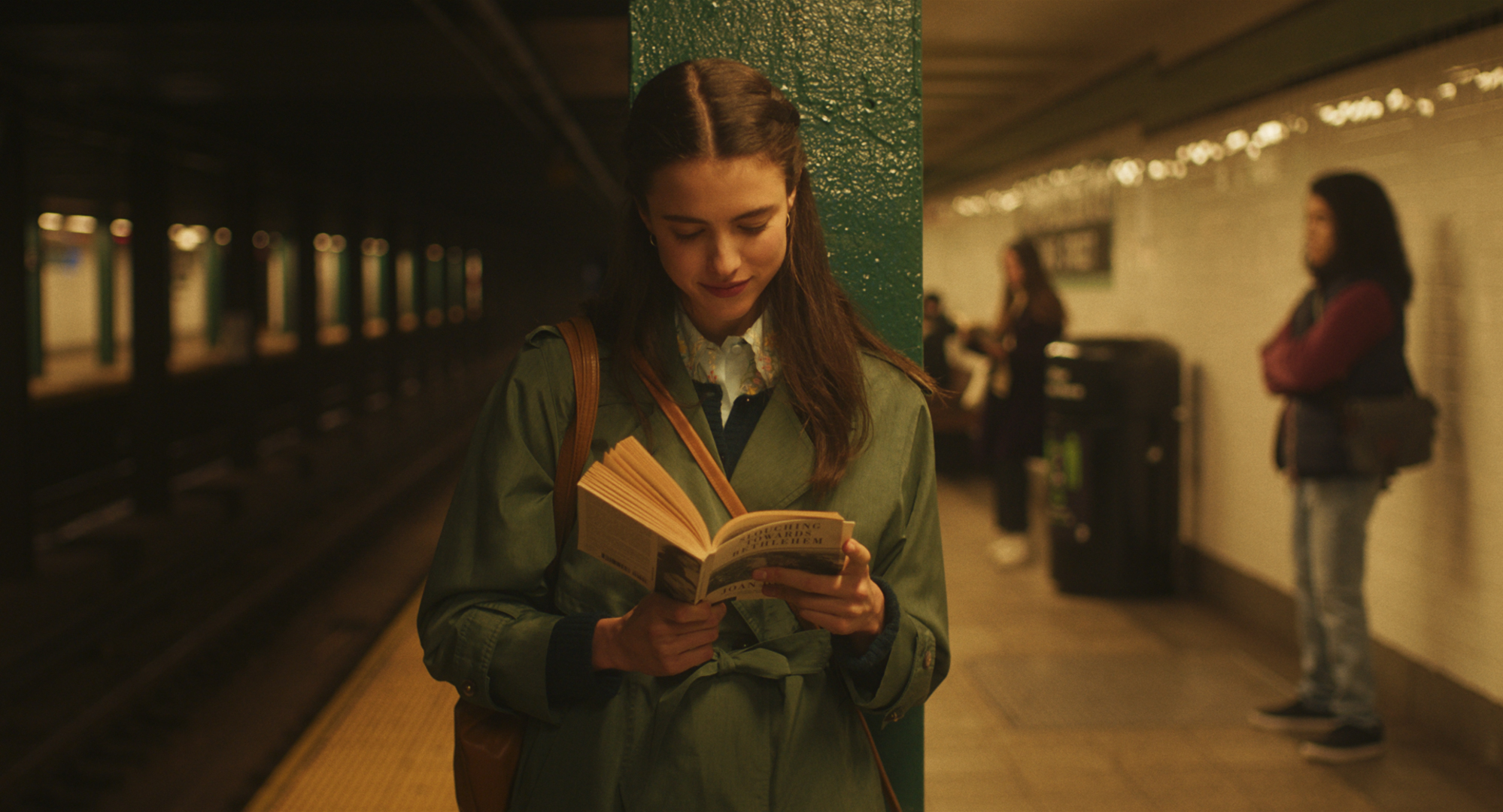
RAKOFF: What’s your favorite recent fiction?
QUALLEY: I love everything Donna Tartt.
RAKOFF: Me too!
QUALLEY: Right? Doesn’t she feel kind of like Harry Potter for adults? She creates these worlds that are so delicious and cozy-feeling. Whenever I finish one of her books, I’m really sad. I remember I was shooting in Bulgaria, and I was alone on Thanksgiving, and I was reading The Goldfinch. And Theo was alone on Thanksgiving. and I was like, “Life is beautiful.” Who’s your favorite of recent fiction?
RAKOFF: Donna Tartt is actually one of my favorites. I love a writer named Diane Johnson, who I feel like you might like—especially her novel, The Divorce, which was turned into a terrible movie, so don’t watch that.
QUALLEY: Okay, I’ll read it.
RAKOFF: Were you nervous to work with Sigourney [Weaver, who plays Joanna’s boss]?
QUALLEY: I was. I mean, she’s a legend. I really look up to Sigourney, because I feel like sometimes women feel like they need to be similar to their male counterparts in order to garner respect. And sometimes that looks like this idea of masculinity being represented in a woman that’s being kind of cold and firm. And that’s the only way that a woman feels like she’ll be respected in a workplace. But with Sigourney, she’s able to demand respect in a way that doesn’t stray from who she is as a human. And as a human she’s somebody who’s really quite childlike and innocent in a lot of ways while being incredibly intelligent and interesting. And so, that was really cool for me to see. She never got robbed of that. She still holds her head so high in a room. She’s an incredible actress.
RAKOFF: I was terrified of her too. And then when I arrived on set, she just kind of walked over and hugged me. When we were filming in Berlin, you kind of gave me a crash course on how to be photographed. I mean, honestly, I don’t know what I would have done if you didn’t.
QUALLEY: Oh my gosh. What did I say? I’m terrified.
RAKOFF: We were about to go into the photo call, and I suddenly froze. And you were like, “It’s okay. Just walk in calmly. Stand up really, really straight. And you’re just going to remain calm. They’re going to be screaming at you. Don’t get flustered by it. And then just slowly make your way around the room, and if someone calls you, you can turn back to them.” And so that’s what I did. I basically pretended I was you, except a foot shorter.
QUALLEY: I wish I took my own advice, because I get out there and I just start really nervously laughing, and I’m slouching my shoulders. I think I basically gave you my publicist’s advice. She would be very proud. One of my earliest experiences with this was on The Nice Guys. I threw up, because I was so overwhelmed and scared. So I get it. I get the fear, but I’ve kind of chilled out since then.
RAKOFF: Do you like being in the public eye? I know recently there was a lot of attention thrust on you around a recent relationship.
QUALLEY: Yeah. I think if for some reason somebody is aware of my person because of my work, I should only be grateful for it. And my life is freaking great. I’m so incredibly lucky. I can’t sit there and pout about anything like that, because I just don’t have the space to.
RAKOFF: But I think you’re not just lucky. You’re talented.
QUALLEY: Thank you.
RAKOFF: But the reason I ask is just because you do seem like a somewhat private person.
QUALLEY: Yeah. I am a private person. And I think I’m just navigating all of it right now. I’m learning lessons, but I’m learning them in a slightly unconventional way.
RAKOFF: Do you have a dream role?
QUALLEY: I have like a million dream roles. I have so much fun acting. It’s just really high-stakes pretend with all of these people helping you play really high-stakes pretend. And that’s just the coolest thing ever to me. I think you can feel it in the product if everybody’s there, just thanking their lucky stars. And so I really just want to work with people that love doing it in the same way that I do, and just play. Because that’s what it is—it’s just really, really high-stakes playing.

